Synergistic Effect of Propidium Iodide and Small Molecule Antibiotics with the Antimicrobial Peptide Dendrimer G3KL against Gram-Negative Bacteria

The research article Synergistic Effect of Propidium Iodide and Small Molecule Antibiotics with the Antimicrobial Peptide Dendrimer G3KL against Gram-Negative Bacteria was just published in Molecules.
There is an urgent need to develop new antibiotics against multidrug-resistant bacteria. Many antimicrobial peptides (AMPs) are active against such bacteria and often act by destabilizing membranes, a mechanism that can also be used to permeabilize bacteria to other antibiotics, resulting in synergistic effects. We recently showed that G3KL, an AMP with a multibranched dendritic topology of the peptide chain, permeabilizes the inner and outer membranes of Gram-negative bacteria including multidrug-resistant strains, leading to efficient bacterial killing. Here, we show that permeabilization of the outer and inner membranes of Pseudomonas aeruginosa by G3KL, initially detected using the DNA-binding fluorogenic dye propidium iodide (PI), also leads to a synergistic effect between G3KL and PI in this bacterium. We also identify a synergistic effect between G3KL and six different antibiotics against the Gram-negative Klebsiella pneumoniae, against which G3KL is inactive.
Author(s): Bee-Ha Gan, Xingguang Cai, Sacha Javor, Thilo Köhler and Jean-Louis Reymond